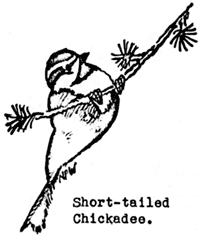|
Volume XII No. 1 - October, 1946
Recovery Of A Banded Gray Jay
By Dr. D. S. Farner, Ranger-Naturalist

On August 6, 1946, in the course of ornithological investigations
along the summit of the Cascade Divide between Annie Springs and Union
Peak, two gray jays (Perisoreus canadensis griseus Ridgway) were
collected from a family group of at least three. The birds were
traveling from tree to tree through a rather dense stand of mountain
hemlock (Tsuga mertensiana (Bong.) Sargent). The collecting
locality was one and one eighth miles southwest of Annie Springs, about
50 yards west of the Union Peak motorway. The altitude of this locality
is approximately 6250 feet. One of the collected specimens had on its
leg Biological Survey Band No. A283458. Mr. F. C. Lincoln kindly
supplied the information that this band had been originally issued to
Mr. W. T. Frost, formerly a ranger at Crater Lake. According to the
data by Mr. Frost this gray jay was banded as an adult at Annie Springs
on December 27, 1937. The bird was retrapped nine times on the day that
it was banded, and four times on the following day. Mr. Frost placed
and additional band of yellow color on the bird's other leg for purposes
of sight identification. This band had been lost by the time of the
above described recovery. This recovery is of interest not only because
of the age of nearly nine years attained by the bird but also as an
indicator of the extremely restricted range of individuals of this
species.
Some Miscellaneous Ornithological Notes
By Dr. D. S. Farner, Ranger-Naturalist

These notes have been selected from my field notes for the summers
of 1940 and 1946. Only those which made a pertinent or interesting
contribution to our knowledge of the birds of Crater Lake National Park
have been included.
Erismatura jamaicensis rubida (Wilson) : Ruddy Duck
A
pair observed about one half mile from Cloud Cap on the surface of
Crater Lake, July 4, 1940. This is apparently a new record for the
park.
Accipiter velox velox (Wilson): Sharp-shinned Hawk
Two
seen in flight near Red Blanket Creek near the south boundary of Crater
Lake National Park, August 28, 1946.
Accipiter cooperi (Bonaparte): Cooper's Hawk
One observed
near the upper end of White Horse Creek Canyon, August 9, 1946.
Buteo regalis (Gray): Ferruginous Rough-leg
One seen in
flight near Discovery Point, August 2, 1946.
Aquila chrysaetos canadensis (L.): Golden Eagle
Single
birds observed between Wizard Island and the south rim on July 29, 1946
and August 3, 1946.
Circus cyaneus hudsonius (L.): Marsh Hawk
One seen in
flight along south rim, July 19, 1946. This bird was in brown
plumage.
Falco peregrinus anatum (Bonaparte): Duck Hawk
One seen
in flight near Red Cone, July 30, 1946. One seen in flight near
Discovery Point, August 9, 1946.

Charadrius vociferus vociferus (L.): Killdeer
One
observed at the boat landing on the south shore of the lake, July 13,
1940.
Larus californicus Lawrence: California Gull
Seen almost
daily in numbers from one to ten on the surface, or flying above the
surface of Crater Lake, July 18, 1946 to September 1, 1946.
Phalacrocorax auritus albociliatus Ridgway: Farallon
Cormorant
Conspicuous by their complete absence from the Phantom
Ship during the 1946 summer.
Megaceryle alcyon caurina (Grinnel): Western Belted
Kingfisher
One observed on Wizard Island, August 4, 1940. One
observed on the Phantom Ship, August 17, 1940.
Asyndesmus lewis Gray: Lewis's Woodpecker
About three
hundred seen between the Watchman and Cleetwood Cove, August 31, 1940.
These birds were feeding and not in actual migration. I observed none
in 1946.
Dryobates pubescens ssp.: Downy Woodpecker
Two observed
near Bear Bluff, August 13, 1946. Not previously recorded from the
park. Specimens are needed for further study.
Picoides tridactylus fasciatus Baird: Alaska Three-toed
Woodpecker
One observed and collected near Red Cone Spring, August
14, 1946.
Nuttallornis mesoleucus (Lichtenstein): Olive-sided
Flycatcher
Common throughout the park during the summer of 1946. A
pair feeding at least three young out of the nest observed near Bear
Bluff, August 13, 1946.
Tachycineta thalassina lepida Mearns: Violet-green
Swallow
About 15 seen in the open area around the headwaters of the
east fork of Munson Creek, July 23, 1946.

Parus gambeli abbreviatus (Grinnell): Short-tailed
Chickadee
A pair with six young out of the nest seen near Park
Headquarters, July 13, 1940.
Sitta carolinensia aculeata Cassin: Slender-billed
Nuthatch
Single birds observed along the south rim, August 9, 19,
26, 1946.
Cinclus mexicanus unicolor Bonaparte: Dipper
One observed
at base of Chaski Slide, July 11, 1940. One observed near boat landing
on south shore of Crater Lake, August 18, 1946. It should be remembered
that the littoral fauna of Crater Lake is essentially that of a mountain
stream and that it is therefore not surprising to find dippers in this
situation.
Salpinctes obsoletus obsoletus (Say): Rock Wren
An adult
and three young seen near the boat landing on the south shore of Crater
Lake, August 2, 1940.
Sialia mexican occidentalis Townsend: Western Bluebird
Three observed near Red Blanket Spring, August 14, 1946. This new
record for the park needs to be confirmed by collected specimens.
Spinus pinus pinus (Wilson): Northern Pine Siskin
A
juvenile bird following an adult and seeking food from it seen along
south rim, August 26, 1946.
Passerella iliaca ssp.: Fox Sparrow
Three seen on Red
Blanket Creek motorway about 2.5 miles from the south boundary. One was
carrying food in its bill indicating that it was possibly a breeding
bird feeding young. One collected, July 8, 1946.
Melospiza melodia ssp.: Song Sparrow
One seen in Munson
Meadows in areas where lincolni was abundant, July 20, 1946.
This needs to be verified by collected specimens to establish it as a
new park record.
- o -
"Nature is the Art of God"
- o -
| 
